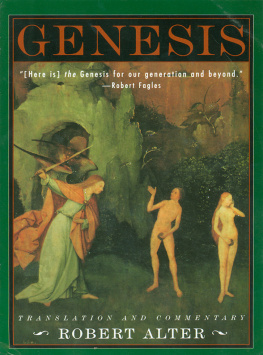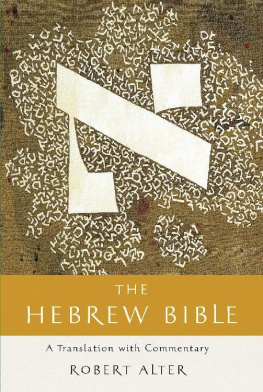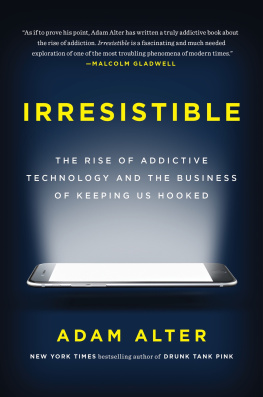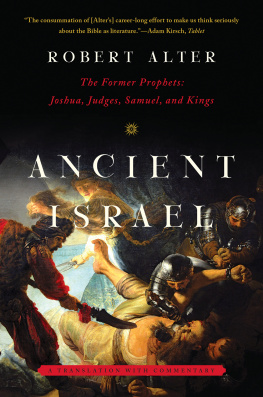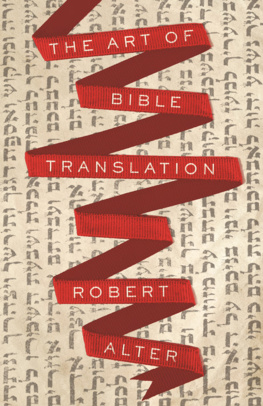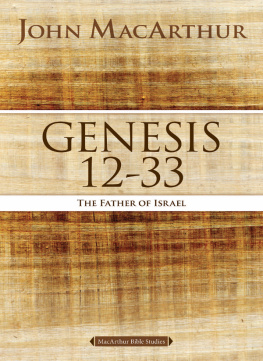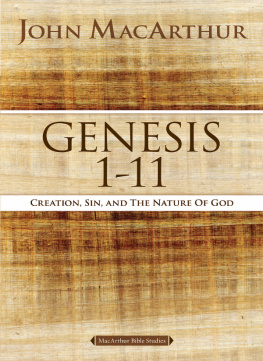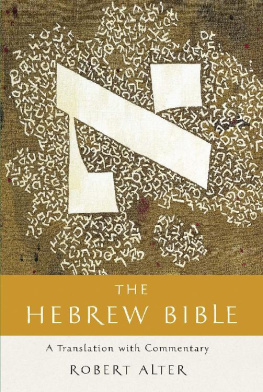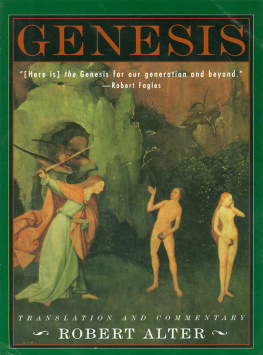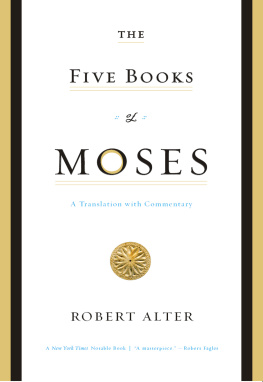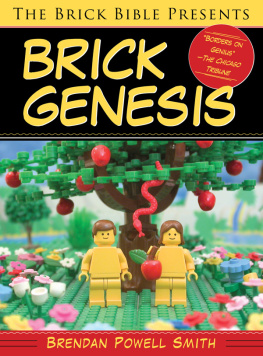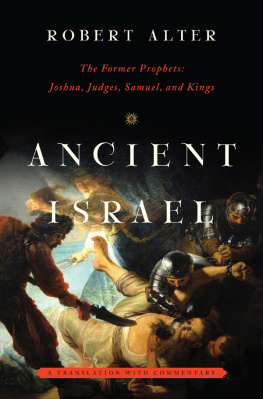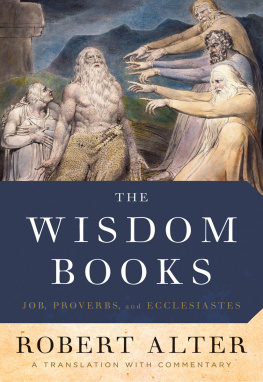M y original intention had been simply to provide brief translators notes. Puns, wordplay in the sundry naming-speeches, and other untranslatable maneuvers of the Hebrew needed to be glossed. The reader also had to be informed, I felt, of the occasional junctures where I adopted a reading that varied from the Masoretic Text, the received Hebrew text of the Bible. Similarly, it seemed proper to offer some explanation for translation choices that were likely to surprise either the general reader or the scholarly reader, or both. In some instances, such a choice reflects a proposed new solution to a crux in the Hebrew text. More often, it is an effort to represent a more precise understanding of the Hebrew than previous translations have shown (e.g., the tree of knowledge is lovely to look at, not lovely to impart wisdom; Pharaoh puts a golden collar around Josephs neck, not a gold chain). And most pervasively, the little surprises in the translation are attempts to find English equivalents for the nuances of implication and the significant changes of diction in the Hebrew that have not been much regarded by previous translators. Finally, since this translation is, within the limits of readable English style, quite literalnot out of fundamentalist principle but in an effort to reproduce some of the distinctive literary effects of the originalwhen the interests of English intelligibility compelled me to diverge from a literal translation, I have alerted readers to the divergence and given the literal sense of the Hebrew words in a note. And beyond all such considerations of word choice and level of style, I thought it necessary to offer succinct explanations of some of the ancient Near Eastern cultural practices and social institutions that are presupposed by the narratives, for without an understanding of them it is sometimes hard to see exactly what is going on in the story.
This last category of explanation is, of course, standard fare in modern Bible commentaries, and is admittedly intended here as an aid for the relatively uninitiated. But as I got caught up once again in this endlessly fascinating text, it struck me that there were important features of Genesis that by and large had been given short shrift in the modern commentaries. In fact, a good many of my observations on stylistic choices already shaded into a discussion of the literary vehicle of the biblical narratives, and this was the point at which the tightly cinched annotation began to loosen its bonds and reach out to commentary. There were whole orders of questions, it seemed to me, that had been neglected or addressed only intermittently and impressionistically by the modern commentators. Where are there detectible shifts of stylistic level in the Hebrew, and why do they occur? What are the reasons for the small poetic insets in the prose narratives? What are the principles on which dialogue is organized, and how are the speakers differentiated? Where and why are there shifts from the narrators point of view to that of one of the characters? What are the devices of analogy, recurrent motifs, and key words, that invite us to link and contrast one episode with another? And does Genesis, granted its composite origins, exhibit overarching thematic and structural unities or lines of development?
On all these challenging questions I have surely not said the last word. Rather I have aspired to say some helpful first words in a commentary that I have sought to hold to modest proportions. Clearly, there is no way of separating a literary illumination of the biblical text from a confrontation with philological issues, on the one side, and, perhaps more indirectly, with historical issues, on the other. In any case, the exploration of Genesis as literary expression is the central focus of this commentary, and I would hope it would be of interest to everyone, from reader at large to scholar, who is drawn to the imaginative liveliness, the complexities, and the sheer narrative inventiveness of these splendid ancient stories.
F or an undertaking as audacious as a new translation of Genesis I felt particularly dependent on the counsel and encouragement of the friends who read my drafts. Thomas G. Rosenmeyer and Leonard Nathan looked at sections of the manuscript and raised some astute questions. The translation and commentary in their entirety were read by three people. Michael Bernsteins enthusiasm, coming from a reader with so discriminating a sense of English style, did a great deal to allay my own early doubts about the conception of Bible translation I was trying to carry out. Stanley Burnshaw, with an editorial eye that is virtually legendary in American publishing, ferreted out misusages, clunky clauses, and logical gaps in the commentary, and also compelled me to reconsider some of my local choices in the translation. My greatest debt is owed to Amos Funkenstein, whose presence I will continue to miss sorely, and to whose memory this book is dedicated. Amos, a great historian and also a brilliant Hebraist, brought to the scrutiny of philological and exegetical problems the same rare lucidity and the same ability to think out old issues in entirely fresh ways that he evinced in his far-ranging studies in intellectual history. When he disagreed with me, he did so vigorously, sometimes vehemently, but also in a spirit of friendly intellectual exchange, and with a reiterated admiration for what I was doing that means more to me than I can say.
Secretarial and research costs were covered by income from the Class of 1937 Chair of Hebrew and Comparative Literature at the University of California at Berkeley. I am grateful to Janet Livingstone for her patient devotion to the arduous task of transfering my handwritten drafts to a computer.
ALSO BY ROBERT ALTER
THE DAVID STORY: A TRANSLATION WITH COMMENTARY OF I AND 2 SAMUEL
HEBREW AND MODERNITY
THE WORLD OF BIBLICAL LITERATURE
NECESSARY ANGELS: TRADITION AND MODERNITY IN KAFKA, BENJAMIN, AND SCHOLEM
THE PLEASURES OF READING IN AN IDEOLOGICAL AGE
THE LITERARY GUIDE TO THE BIBLE
(coeditor with Frank Kermode)
THE INVENTION OF HEBREW PROSE
THE ART OF BIBLICAL POETRY
MOTIVES FOR FICTION
THE ART OF BIBLICAL NARRATIVE
A LION FOR LOVE: A CRITICAL BIOGRAPHY OF STENDHAL
DEFENSES OF THE IMAGINATION
PARTIAL MAGIC: THE NOVEL AS SELF-CONSCIOUS GENRE
MODERN HEBREW LITERATURE
AFTER THE TRADITION
FIELDING AND THE NATURE OF THE NOVEL
ROGUES PROGRESS: STUDIES IN THE PICARESQUE NOVEL
GENESIS
W hen God began to create heaven and earth, and the earth then was of each kind. And so it was. And God made wild beasts of each kind and cattle of every kind and crawling things on the ground of each kind, and God saw that it was good.
and all the crawling things that crawl upon the earth.
And God created the human in his image,
in the image of God He created ,
male and female He created them.
And God blessed them, and God said to them, Be fruitful and multiply and fill the earth and conquer it, and hold sway over the fish of the sea and the fowl of the heavens and every beast that crawls upon the earth. And God said, Look, I have given you every seed-bearing plant on the face of all the earth and every tree that has fruit bearing seed, yours they will be for food. And to all the beasts of the earth and to all the fowl of the heavens and to all that crawls on the earth, which has the breath of life within it, the green plants for food. And so it was. And God saw all that He had done, and, look, it was very good. And it was evening and it was morning, the sixth day.
2.. The Hebrew

